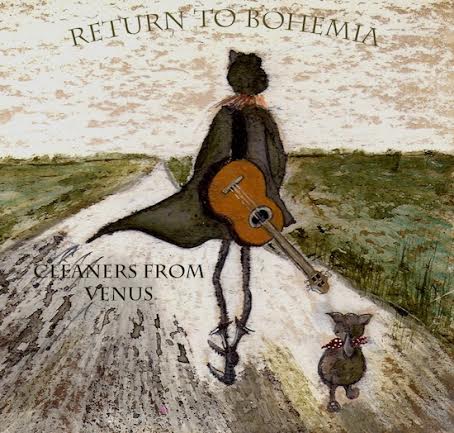This is one of those albums pop fanatics dream of. A collection of songs that – once one gets past the initial "wow!", and this may take a long time – picking a favourite from will be endlessly debated. It would be hard to imagine a finer record released this year. And the composer knows it too. The sleeve notes on the promo read "These songs of quality were written, played, and produced by Martin Newell on a Tascam Pocketstudio, using real musical instruments." If you’re familiar with our Quietus interviews with the ever-entertaining Mr. Newell, you will know how much importance he places on The Song, finding the state of that artform today highly lamentable. And as evidenced by last year’s report of Martin’s coming back from being literally dead for a few moments, these past eighteen months have seen the Wildman of Wivenhoe besieged by numerous health problems. The whole experience was a major catalyst for how well Return To Bohemia turned out – "If this was gonna be the last record, it was going to be a fucking great one." Thankfully he is well on the mend now, and this promise did indeed deliver.
According to Newell’s blog, the project began with the idea of writing a song for Eurovision. The Royal Bank Of Love would not have been out of place in Martin’s glam rock days of the early 70s. Big ringing descending chords support anthemic idealism (dreams of change, ending war, housing the homeless) complete with sustained melodic guitar solo that effortlessly glides down the scale towards resolution, expressing these sentiments perfectly. All in 2 minutes 39 seconds.
As ever though, it’s further back in the 60s where Newell’s pop heart lies. Evident even in the titles – ‘Marilyn’ makes an appearance again, The Avengers come knocking in the Kinks-y boots of ‘Mrs. Gale & Her New Lover’, and of course there’s ‘The King Of The Sixties’. Martin’s ‘Mr. Jangle’ moniker has never been more apt, with chiming guitars in abundance. Reminiscent of his earlier ‘She Rings The Changes’, rocker ‘Cling To Me’ kicks off the album with a bang. But it’s the following ‘He’s Goin’ Out With Marilyn’ that’s one of Bohemia‘s immediate highlights. Its infectious suspended chord chorus guaranteed to be stuck in your head for days.
The album’s two romantic ballads show Newell at the top of his game in a form he’s already proved himself a master of many times over. ‘The Days Of May’ is gorgeous minor wistfulness – Newell always stays the right side of melancholy – laced with evening shadow twists that go straight for the heart. ‘The Band Plays Delilah’, just as lovely, lies at the other end of the spectrum. Major key memories slide out from unsuspecting scenes, gathering in a processional to a triumphant chorus where ‘the dancers hold each other closer still’ and all seems right if just for a moment. Similar in tone to these two numbers is the lovely psychedelic wash of the Beach Boys-flavoured ‘Imaginary Seas’.
But it’s not all poignancy and matters of the heart. The faux-funk social satire of ‘Welcome To Bohemia’ is hilarious, showing off the lighter side of Newell’s verse. He’s the most published living English poet, you know. And the album closes on a more fleshed-out version of the Beatles-y ‘I Wanna Stay In’, first released on In Chimp World. You can guess what that’s about.


